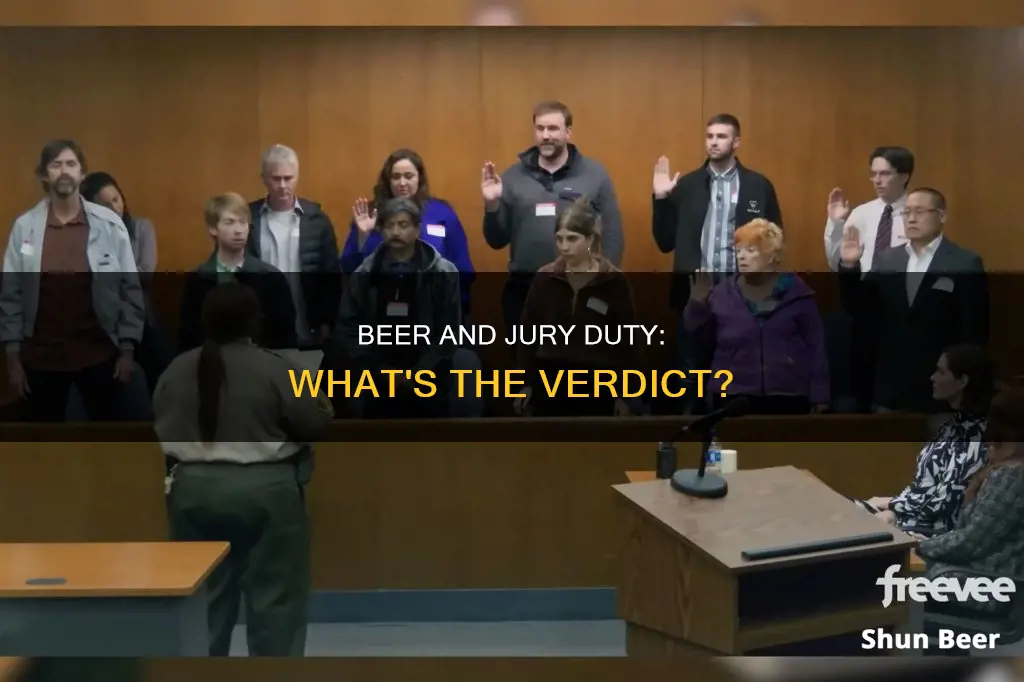
Drinking alcohol while serving on a jury is generally frowned upon, but it is not always illegal. In the US, the Supreme Court has ruled that jurors consuming alcohol or drugs during a trial does not constitute an 'outside influence' and is not grounds for overturning a verdict. However, appearing for jury duty drunk will likely result in dismissal from service. While there is no explicit prohibition on alcohol, jury members are advised to avoid drinking before jury duty as it can affect their ability to focus and may cause discomfort.
What You'll Learn

Drinking while jurying is not an 'outside influence'
Drinking while on jury duty is a contentious issue that has been debated for centuries. While it is generally agreed upon that jurors should not consume alcohol during their service, the legal implications of doing so are not always clear. In some US states, the consumption of even a single drop of alcohol by a juror is considered grounds for a mistrial. However, in other states, there must be evidence that the alcohol has impaired the juror's ability to carry out their duties for legal repercussions to be considered.
The question of whether drinking while jurying constitutes an "outside influence" has been addressed by the US Supreme Court. In the 1987 case of Tanner v. United States, the Court ruled that juror misconduct involving alcohol and drug consumption did not constitute an outside influence. This ruling was cited by Manhattan Supreme Court Judge Ellen Coin in 2004 when she refused to set aside the verdict in a case where a juror had been drinking during deliberations.
Judge Coin's decision highlights the complex nature of the issue. While acknowledging that drinking on jury duty is "reprehensible," she ultimately deferred to the higher court's ruling. The Supreme Court's decision rested on the argument that voluntarily ingested substances, such as alcohol or drugs, are no more of an outside influence than other factors such as a virus or lack of sleep.
The implications of this ruling are significant, as it sets a precedent for how courts should handle similar situations. It suggests that while drinking while on jury duty is not advisable, it may not automatically result in a mistrial or the overturning of a verdict. However, it is important to note that each case is unique, and the specific circumstances surrounding juror misconduct will likely play a role in the court's decision-making process.
In conclusion, while drinking while jurying may be frowned upon, it is not necessarily considered an outside influence that would invalidate a jury's decision. The legal system must weigh the impact of such actions on the fairness and integrity of the trial, taking into account the specific circumstances of each case.
Beer Distribution in Georgia: A Complex System Explained
You may want to see also

Drinking alcohol during prohibition
While drinking alcohol was not illegal during the Prohibition era, the production, importation, transportation, and sale of alcoholic beverages were prohibited. This period, lasting from 1920 to 1933, saw a rise in bootlegging and black markets as Americans found creative ways to obtain and consume alcohol. Here are some insights into drinking alcohol during this time:
Creative Ways to Obtain Alcohol:
Americans who wanted to continue drinking had to resort to creative measures. Some stockpiled wines and liquors before the start of Prohibition, while others turned to illegal methods such as bootlegging and black markets. European spirits were ferried from offshore, whisky was smuggled from Canada, and rum was brought in from the Caribbean. "Gin" was also created from industrial alcohol and diluted with juniper oil.
Speakeasies and Secret Drinking:
Speakeasies, or illegal bars, became popular during Prohibition. These establishments were often filled with people hiding and consuming poorly made drinks created from whatever alcohol they could obtain. It was common for people to have to walk a certain distance or speak loudly to bartenders to obtain drinks, giving rise to the phrase "speakeasy." While drinking in speakeasies was illegal, it was also exciting and forbidden, attracting many patrons.
Low-Quality and Dangerous Alcohol:
With the alcohol trade moving underground, there was little to no guarantee of the quality or safety of the beverages consumed. Speakeasy liquor could contain anything from single-malt Scotch to diluted embalming fluid. This led to numerous cases of alcohol poisoning and even deaths.
Rise of Cocktails and Mixers:
To disguise the taste of questionable liquor, mixers became increasingly popular during Prohibition. Faux-gin tasted better with tonic than in a martini, and bootleg whiskey was more palatable when mixed with ginger ale. Coca-Cola also benefited from this trend, selling to both teetotalers and drinkers trying to mask the taste of their illicit beverages.
Women and Drinking:
Prohibition and the emergence of speakeasies challenged traditional gender norms and contributed to the entry of women into drinking spaces. Speakeasies, unlike the old American saloons, were often open to both men and women. This shift continued even after Prohibition, with women enjoying newfound freedom and equality in cocktail bars and supper clubs.
Alcohol-Related Violence and Crime:
The criminalization of alcohol led to the emergence of powerful criminal organizations and a boost in black-market violence. Mafia groups and gangs, which previously focused on prostitution, gambling, and theft, expanded their operations to include bootlegging. This resulted in increased crime rates, including theft, homicide, assault, and drug addiction.
In conclusion, while Prohibition aimed to curb alcohol consumption, it ultimately failed to do so. Americans found ways to obtain and consume alcohol, albeit often risking their health and safety in the process. The era significantly impacted drinking culture in the country, shaping how Americans drink even a century later.
Morning Beer: Should You Drink Before Work?
You may want to see also

Prohibited items while on jury duty
While on jury duty, it is important to be aware of the prohibited items that you are not allowed to bring with you. Here is a list of items that are typically prohibited in courthouses, particularly while serving on jury duty:
Weapons and Security-Related Items:
- Any type of firearm, knife, or edged instrument, including blades of any kind and P-38 military can openers.
- Stun guns, pepper spray, or mace sprays.
- Heavy metal objects such as locks, chains, handcuffs, large keys, and heavy metal belt buckles.
- Tools, utensils, knitting needles, or hat pins.
- Explosive or flammable devices or materials, including corrosives, combustible liquids, and fireworks.
- Any item that could be considered a potential weapon, as determined by the Court.
Other Prohibited Items:
- Non-prescription drugs are prohibited. Prescription drugs are allowed but must be in their original bottle with the juror's name on the label.
- Open beverages like coffee or soda are not allowed. Factory-sealed beverages are permitted.
- Disguises and masks are prohibited. However, appropriate face coverings, as recommended by the local health department, are usually allowed.
- Signs or banners with sticks or pipes attached are not allowed.
It is important to note that some courthouses may have specific guidelines and restrictions, so it is always a good idea to review the security screening guidelines of the specific courthouse or county before arriving for jury duty.
Mixing Beer and Nyquil: Safe or Risky?
You may want to see also

Jury duty and bathroom breaks
Jury duty can be a long and arduous process, and it's understandable that jurors will need to take breaks during the trial. While it may be necessary to remain in the courtroom for extended periods, jurors are generally allowed to take bathroom breaks when needed.
In most jurisdictions, jurors are permitted to take breaks at regular intervals. These breaks can range from 15 to 20 minutes and provide an opportunity for jurors to use the restroom, stretch their legs, or attend to any other personal needs. The court is typically aware that jurors may have a range of issues and will accommodate their requests for breaks.
However, there may be times when a juror needs to use the restroom outside of the designated break times. In such cases, jurors can usually raise their hand or gesture to the bailiff, who is responsible for maintaining order in the courtroom. The bailiff will then inform the judge, and the juror will be allowed to take a break. This process ensures that jurors can attend to their basic needs without disrupting the trial unduly.
It is important to note that the specific procedures for requesting bathroom breaks may vary depending on the courthouse and the presiding judge. In some cases, jurors may be instructed to follow certain protocols when needing to use the restroom. Nonetheless, the court generally recognizes the importance of allowing jurors to take breaks and will accommodate their requests accordingly.
While the consumption of alcohol during jury duty is prohibited, the historical accounts of "drinking while jurying" provide a fascinating insight into the challenges faced by courts over the centuries. In modern times, the focus is on ensuring juror comfort and well-being, including providing access to regular bathroom breaks when needed.
Bottoms Up Beer: How Does This Novelty Work?
You may want to see also

Drinking before jury duty
While there may be no explicit prohibition against drinking alcohol before jury duty, it is generally understood that jurors should refrain from any substance that could influence their decision-making abilities. Drinking alcohol before jury duty could be seen as an attempt to influence your judgment or impair your ability to understand the proceedings and make informed decisions.
Additionally, drinking alcohol may lead to dehydration, which can further impact your ability to concentrate and make decisions. It is important to stay hydrated and maintain your physical and mental well-being during jury duty. Drinking water or other non-alcoholic beverages is a better option to stay hydrated and maintain your focus.
In some jurisdictions, bringing beverages into the courtroom or jury deliberation room may be prohibited or restricted. Open beverages, such as coffee or soda, may be allowed, but you may be required to finish drinking them before entering the courthouse. Factory-sealed beverages may be permitted in some cases. It is important to check the specific rules and regulations of the courthouse or jurisdiction where you are serving jury duty.
While the legal system has a long history of grappling with the issue of drinking while serving on a jury, it is generally agreed that excessive alcohol consumption by jurors is unacceptable. In some historical cases, juror drunkenness has resulted in mistrials or the overturning of convictions. Therefore, it is best to avoid drinking before jury duty to ensure you are fulfilling your civic duty responsibly and effectively.
Enjoying Beers Responsibly on Work Nights: A Guide
You may want to see also
Frequently asked questions
It is not recommended to drink beer or any alcoholic beverage before or during jury duty. While there are no explicit prohibitions against drinking alcohol on jury duty, it is important to maintain professionalism and avoid any substances that may impair your judgment or ability to serve as a juror.
Drinking alcohol during jury duty can have serious consequences. If it is discovered that a juror is intoxicated, they may be dismissed from the jury and, in some cases, face legal repercussions such as tampering with evidence or contempt of court. It is essential to take the responsibilities of a juror seriously and avoid any actions that could compromise the integrity of the legal process.
Yes, there are restrictions on prohibited items when reporting for jury duty. These items include weapons, sharp objects, certain types of medication, and open beverages. It is important to check with your local courthouse or jury duty website for a comprehensive list of prohibited items to ensure compliance with their specific guidelines.







